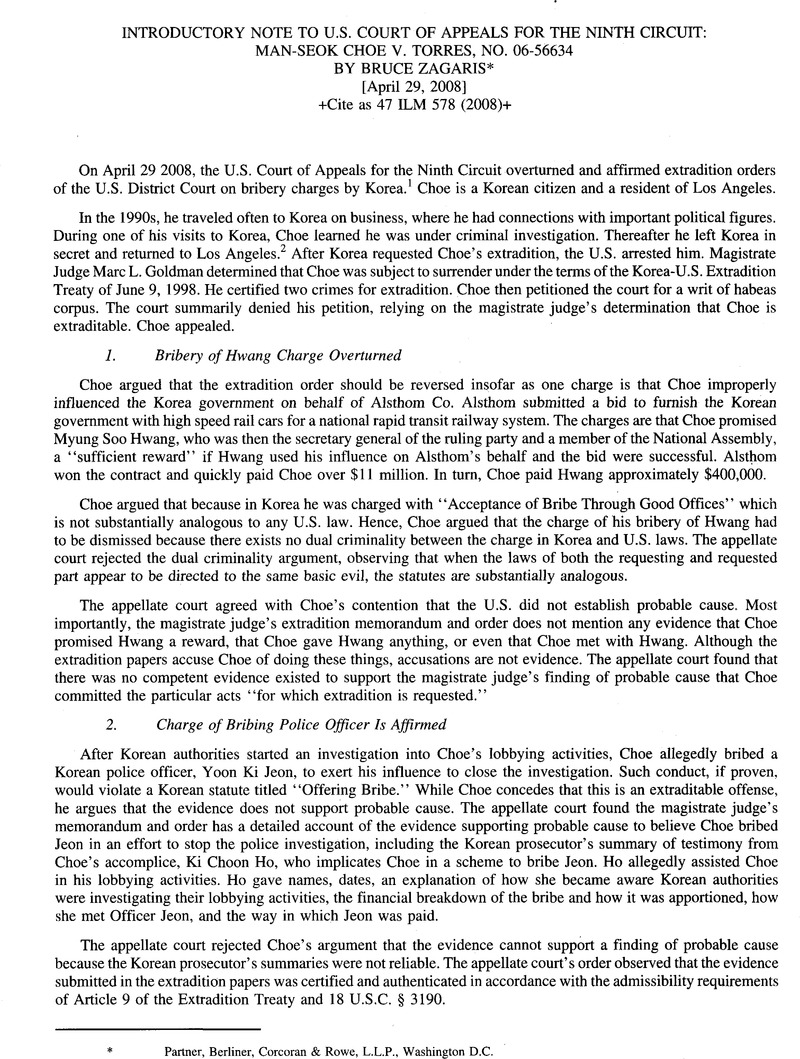No CrossRef data available.
Article contents
U.S. Court of Appeals for the Ninth Circuit: Man-Seok Choe v. Torres, No. 06-56634
Published online by Cambridge University Press: 27 February 2017
Abstract

- Type
- International Legal Documents
- Information
- Copyright
- Copyright © American Society of International Law 2008
References
Endnotes
1 Man-Seok Choe v. Torres, U.S. Court of Appeals for the 9thCir., No. 06-56634 (Apr. 29, 2008)
2 Much of the discussion of the facts was adopted from the article by Bruce Zagaris, Court of Appeal Affirms and Overturns Extradition Request to Korea on Bribery Charges, 24 Int'l Enforcement L. Rep. 269 (June 2008).
3 M. Cherif Bassiouni, International Extradition United States Law And Practice 500-501 (2007).
4 18 U.S.C. § 3184.
5 Ex Parte Bryant, 167 U.S. 104, 105 (1897).
6 Caltagirone v. Grant, 639 F.2d 739 (2d Cir. 1980); Parretti v. United States, 122 F.3d 758, 764-76 (9th Cir. 1997), withdrawn on other grounds, 143 F.3d 508 (9th Cir.) (En bane), cert, denied, 525 U.S. 877 (1998). Michael Abbell, Extradition To And From The United States § 3-2(14) (2007).
7 For a discussion of the statutes of limitations in extradition treaties, see Abbell, supra, at §3-2(18).
* This text was reproduced and reformatted from the text appearing at the findlaw website (visited June 6, 2008) <http://caselaw.lp.findlaw.com/data2/circs/9th/0656634p.pdf>.
1 Courts may only certify crimes for extradition. 18 U.S.C. § 3184. The ultimate decision whether to extradite is left to the Secretary of State. Id.; Blaxland v. Commonwealth Dir. of Pub. Prosecutions, 323 F.3d 1198, 1208 (9th Cir. 2003).
2 While the magistrate judge's determination that Choe is extraditable is not subject to direct appeal, it is subject to collateral review by way of habeas corpus. See Oen Yin-Choy v. Robinson, 858 F.2d 1400, 1402 (9th Cir. 1988).
3 Article 2 provides: [A]n offense shall be an extraditable offense … whether or not the constituent elements of the offense differ under the laws in [Korea and the United States], provided that the offenses under the laws of both States are substantially analogous. Treaty art. 2(3).
4 This is the title of the Korean statute as translated in the extradition papers.
5 Pursuant to Article 18 of the Treaty, the United States represented Korea's interests before the magistrate judge.
6 As we see below, Korea also has a conventional bribery statute. See p.4604 infra. The United States urges us to certify Choe's alleged bribe to Hwang as a violation of that statute. But changing the legal theory can't cure the lack of evidence that Choe bribed Hwang. In any event, we don't have the power to certify new offenses for extradition. If the government believes it can extradite Choe on the charge that he violated Korea's conventional bribery statute by bribing Hwang, it must make that case before an extradition court, which has the power to determine in the first instance whether Korea's extradition papers support such a charge and whether the evidence is “sufficient to sustain” it. 18 U.S.C. § 3184; see United States v. Doherty, 786 F.2d 491,501-03 (2d Cir. 1986).
7 Article 9 of the Treaty provides that documents are admissible when “they are certified by the principal diplomatic or consular officer of the Requested State resident in the Requesting State; or [when] they are certified or authenticated in any other manner accepted by the law of the Requested State.” Treaty art. 9(a)-(b).
8 18 U.S.C. § 3190 provides that documents offered in evidence upon the hearing of any extradition case shall be received and admitted as evidence on such hearing for all the purposes of such hearing if they shall be properly and legally authenticated so as to entitle them to be received for similar purposes by the tribunals of the foreign country from which the accused party shall have escaped, and the certificate of the principal diplomatic or consular officer of the United States resident in such foreign country shall be proof that the same, so offered, are authenticated in the manner required.
9 At oral argument, the United States argued for the first time that we do not have the authority to deny extradition on the basis of the Treaty's statute of limitations provision because this provision is couched in discretionary terms. See Treaty art. 6 (“Extradition may be denied … when … punishment of the offense … would have been barred because of the statute of limitations of the Requested State had the same offense been committed in the Requested State.”) (emphasis added). According to the United States, only the Executive Branch can take action on the basis of discretionary Treaty language. Because this argument was raised for the first time on appeal, it is waived. Cf. Broad v. Sealaska Corp., 85 F.3d 422, 430 (9th Cir. 1996).
10 We reject Choe's argument that he could not have had the intent to avoid prosecution because no charges were pending when he fled Korea. It is well settled that one can flee from justice for purposes of tolling the statute of limitations even if no charges are pending at the time of flight. United States v. Ballesteros-Cordova, 586 F.2d 1321, 1323 (9th Cir. 1978) (per curiam). Here, Choe knew he was under investigation for serious crimes when he disappeared.




